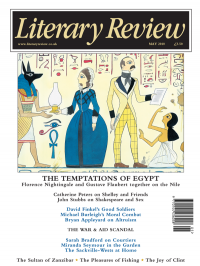Patricia Duncker
Les Hommes Bleus
Desert
By J M G Le Clézio, Translated from the French by C Dickson
Atlantic Books 352pp £16.99
The choice of J M G Le Clézio as the winner of the 2008 Nobel Prize for Literature proved to be surprisingly controversial among French intellectuals in Paris. Why? Surely a writer who has written over forty volumes, including novels, tales, essays and stories, and received many major French literary prizes, would be acclaimed for his achievement? Le Clézio won the Prix Renaudot for his debut novel Le Procès-verbal (1963), and for Desert (1980), now published in English for the first time, he was honoured with the Grand Prix de littérature Paul-Morand, awarded by the Académie française. The sniping and whispers are, if the blogs are to be believed, political in origin. Le Clézio is not read as an ‘écrivain engagé’, a writer committed to contemporary politics on the page and in the flesh. He is neither Camus nor Sartre. Instead, he is an ‘écrivain-voyageur’, a writer whose journeys to the far corners of the earth – Mexico, Korea, Africa, the Sahara desert – are his subject and his inspiration; a writer whose texts bear witness to his fascination with the myths, rites and spiritual mysteries of cultures far removed from his own.
Desert is structured around two characters and two psychologically linked narratives. Nour, a desert boy and follower of the great sheik Ma al-Aïnine, witnesses the last journey of the desert tribes and their destruction at the hands of the French-led colonial powers at the Battle of Agadir in

Sign Up to our newsletter
Receive free articles, highlights from the archive, news, details of prizes, and much more.@Lit_Review
Follow Literary Review on Twitter
Twitter Feed
Russia’s recent efforts to destabilise the Baltic states have increased enthusiasm for the EU in these places. With Euroscepticism growing in countries like France and Germany, @owenmatth wonders whether Europe’s salvation will come from its periphery.
Owen Matthews - Sea of Troubles
Owen Matthews: Sea of Troubles - Baltic: The Future of Europe by Oliver Moody
literaryreview.co.uk
Many laptop workers will find Vincenzo Latronico’s PERFECTION sends shivers of uncomfortable recognition down their spine. I wrote about why for @Lit_Review
https://literaryreview.co.uk/hashtag-living
An insightful review by @DanielB89913888 of In Covid’s Wake (Macedo & Lee, @PrincetonUPress).
Paraphrasing: left-leaning authors critique the Covid response using right-wing arguments. A fascinating read.
via @Lit_Review